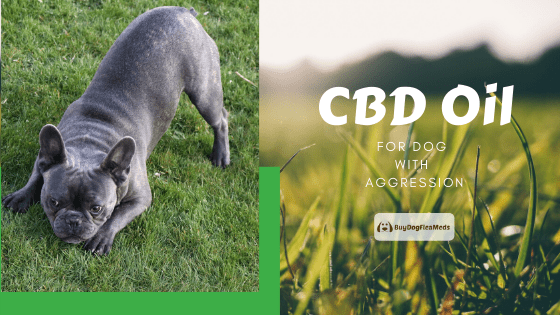Can CBD Oil For Dogs & Cats Help With Aggression?
What is Aggression in Dogs and Cats?
Aggression refers to a wide variety of behaviors that occurs for a multitude of circumstances and reasons. Naturally, all wild animals are aggressive when defending themselves and their family (especially the offspring) and when they are guarding their territory.
The following are contributing factors to aggression in dogs:
- Poor Nutrition
Dogs that are on a poor-quality diet may become aggressive. This is because they are not getting the proper nutrition for proper brain function.
- Physical Condition
Dogs that are in pain or that are sick tend to become aggressive. Pain-inducing conditions such as ear infections, arthritis, injury, and oral problems can turn a calm dog into an aggressive one.
Conditions and diseases that affect the brain also contribute to aggression. Examples of these conditions are hypoglycemia, head injury, encephalitis, and brain tumors.
- Lack of Puppyhood Socialization
Puppies that were undersocialized or have had traumatic experiences during their socialization stage have higher tendencies of being aggressive when they become adults.
On the other hand, aggression in cats builds up from vulnerability accounts. It can be caused by an environmental change, genetic predisposition, a health condition, and fear.
If a cat shares a home with other cats or other animals, it may assert its dominance within the social group, becoming aggressive towards others. This is most relevant as the cat reaches the social maturity age.
Different Types of Aggression
There are different types of aggression in cats and dogs.
The following are the types of canine aggression:
Protective Aggression
This is when a dog protects members of his family. This is either against another animal or even from his owner and other people. This is mostly seen from mother dogs wherein they are extremely protective of their puppies. They become hostile to anyone who goes near them.
Fear Aggression
This type of aggression is when the dog is afraid and tries to flee from a scary situation. A dog exhibiting fear aggression retreats but attacks when cornered, as well as snarls and even bites anyone who comes near.
Social Aggression
This usually happens when the dog was undersocialized as a puppy. The dog reacts aggressively towards others in any social situation. Dogs that are not properly socialized with people and other animals tend to turn to aggression.
Frustration-elicited Aggression
Dogs that are restricted, like being on a leash or in a fenced yard, may behave aggressively. Sometimes when they cannot act on certain stimuli they become aggressive. This can also happen when they get overly excited about something like going on a walk that they nip their handler.
For cats, the following are types of their aggression:
Inter-cat Aggression
This is when cats do not socialize well with other felines. This is the same as social aggression in dogs.
Predatory Aggression
This is one of the strongest types of cat aggression. This needs a separate and specialized treatment. If not treated immediately and properly, the cat may attempt to prey on inappropriate things, such as a hand, a foot, or even an infant.
Other types of aggression in cats include fear aggression and territorial aggression.
How to Prevent Aggression in Dogs and Cats
The best way to prevent aggression in cats and dogs is proper care. If the dogs and cats are well fed, given proper attention, and properly socialized, the chance of aggression decreases.
Keeping cats and dogs calm also helps prevent aggression. Letting them have their own space lets them relax. Giving supplements for brain health is likewise encouraged. With good brain function, canines and felines alike are able to react in a good manner.
Symptoms of Aggression in Pets
The following are symptoms that a dog has aggression:
- Guttural or threatening bark
- Becoming rigid or very still
- Snarling (combination of showing teeth and growling)
- Muzzle punch (the dog uses his nose to punch a person)
- Snapping
- Quick bite that tears the skin
- Repeated bites in rapid succession
- Biting that leads to a bruise
- Bite and shake
- Charging or Lunging forward at a person that did not touch them
- Overprotection of their food, territories, and toys
Here are the symptoms of aggression in cats:
- Tail is straight up
- Dilated pupils
- Hissing
- Swatting
- Attacking with teeth and claws
- Arched back
- Showing teeth
- Raised hair at the back
- Drawing in limbs to hide belly and neck
- Pouncing
- Stalking
- Marking a territory with spraying or chin-rubbing
Natural Home Remedies for Dog and Cat Aggression
Aggression can be treated with therapy and certain medications. There are also home remedies that control the aggressive behavior of cats and dogs.
Here are the most popular natural remedies for dog aggression:
Chamomile
This is an herb used to reduce symptoms of anxiety, stress, and aggression.
Passion Flower
This plant contains several flavonoids. Flavonoids help soothe tension, promote relaxation, and relieve occasional panic and anxiety caused by emotional stress.
Skullcap
This is an herb known to calm anxiety and trauma. This is very helpful for dogs that become aggressive when stressed.
Belladonna
This suited for dogs that lash out aggressively for no apparent reason.
Amino Acid Supplements
Giving amino-acid supplements reduce aggressive behavior. An example of these is tryptophan, which increases the levels of serotonin (calming neurotransmitter) and melatonin (sleep-inducing hormone) in the brain.
The following are some natural home remedies for cat aggression:
Pheromone Sprays
This type of spray mimics the pheromones that are naturally produced by cats. This triggers the cat’s body to relax.
Catnip
This is an herb that makes many cats go crazy but also quickly settle down for a recovery nap. This is after the high wears off.
It is best to keep the nip in a small pouch or toy. This is to prevent the cat from vomiting or feeling nauseated from eating the herb.
Earthing
This is done by letting the cat lay or play on the ground, which emits an electrical charge that balances the nervous system. For cats staying indoors, Earthing can be done by using a grounding pad or grounding sheet.
And of course, there are remedies suited for both cats and dogs, the best of which is cannabidiol (CBD).
How much CBD should I give my Dogs and cats with Aggression?
CBD is one of the best treatments for many pet conditions. It is used to treat or manage stress, anxiety, cancer, pain, and aggression.
CBD oil aids in treating aggression through its cannabinoids that interact with certain receptors in the body. This modulates anxiety, pain, and aggressive behavior. In other words, it calms and relaxes pets.
Click for CBD Dosage chart for dogs
For dogs, the recommended dose of CBD for aggression is 0.2-0.5mg/kg. This is given two times a day. For drops, it is 1-2 drops of CBD, twice a day. The recommended dose for cat aggression is 1-2 drops of CBD oil twice a day.
This natural remedy can be given directly to any dog or cat. CBD can also be added to food or pet treats.
References
https://www.aspca.org/pet-care/dog-care/common-dog-behavior-issues/aggression
https://petmd.com/cat/conditions/behavioral/c_ct_aggression
https://www.natural-dog-health-remedies.com/aggression-in-dogs.html
https://www.thesprucepets.com/dogs-and-aggression-1118229
https://www.holisticpetinfo.com/Dog-Aggression.html

